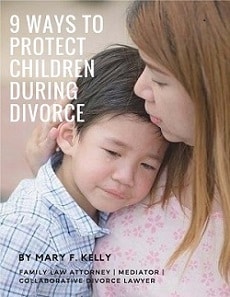You and your spouse are facing divorce. You may agree about divorcing, or one spouse may say, “The marriage is over and I want a divorce.” Whether you or your spouse initiates the divorce or it’s a mutual decision, you are facing a life-changing event that is sad and difficult for parents and children. Your divorce can be a good one if both spouses work toward a fair deal with minimal acrimony, as in collaborative divorce or mediation.
No-fault divorce
New York State has a “no-fault” divorce law, so one spouse can get a divorce even if the other is reluctant or opposed, as long as the moving party can say, under oath, that the marriage has been irretrievably broken for six months or more. This means that most couples can avoid legally blaming one another for the end of the marriage, or the cost of a legal defense if one is wrongly accused.
However, you must still divide your marital assets, and resolve custody and support for your children. A good divorce is possible if you are reasonable, realistic, and responsible. Some ways to prepare for the main issues:
Finances
Review your finances. Be informed about all of your assets, income, and debts. Both parties should know their incomes, their bank accounts and stock accounts, if any; their health insurance and life insurance policies; the expenses of their home or apartment; and their monthly household costs. Living expenses usually go up in a divorce, as one spouse finds a new place to live. Knowing how your money is spent every month will help you manage the new costs, as well as help determine if one of you needs spousal support, and working out a the amount with your spouse and attorneys will help you avoid acrimonious litigation.
Residence
Decide whether one of you will remain in the marital residence, or if you both need to move, sell your residence, and find new places to live. You may love your home, but in a divorce you must decide whether this home really serves your needs and the needs of your children, and whether you can afford the cost of the home once you and your spouse are divorced.
Support
See an attorney and determine what support your spouse and your children may be entitled to. New York State law spells out the percentage of income that parents must pay to support their children until they are emancipated. Child support includes basic monthly support, health insurance and life insurance, unreimbursed medical and dental costs, child care, and may include “add-ons” like sports, music, tutoring, and college.
Spousal support is subject to the court’s discretion. If one spouse needs support to pay her or his expenses, the amount of such support will vary, depending on factors like available income, age, ability to become employed, and health.
Attorney
Hire an attorney who charges reasonable fees, who is realistic and compassionate, who answers your questions and explains your rights and responsibilities, and who assesses best-case scenarios about your goals and needs. Litigation is the traditional, adversarial way to get divorced. A collaborative divorce attorney represents you in an out-of-court process that addresses both your needs and your spouses. In mediation, you and your spouse are guided by an attorney through the issues that need to be settled. References from knowledgeable family and friends are good sources for attorneys.
A good divorce
Remember, divorce means you are ending a relationship with your spouse and, and if you have children together, you are beginning another phase with a co-parent who lives elsewhere. At the same time, you are beginning a new life. A good divorce allows you to move forward without continuing anger and hostility and with the financial means to start again.
© 2013 Mary F. Kelly



